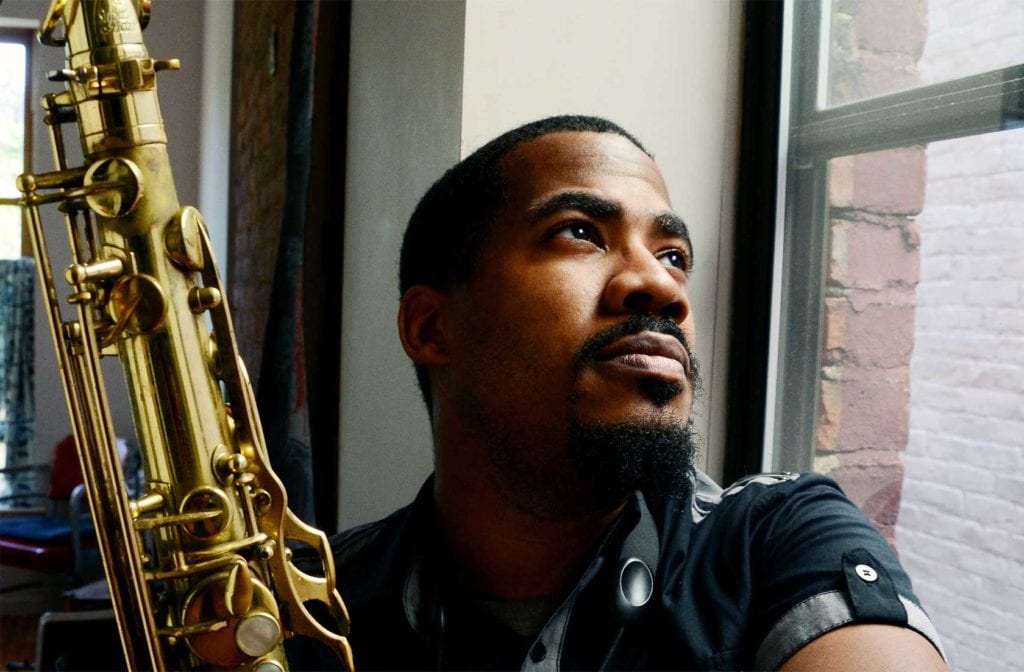
James Brandon Lewis’s latest album, “Jesup Wagon,” is inspired by George Washington Carver, the Black scientist and polymath whose inventions changed the world. Stirring up the world of music with his saxophone and compositions, Lewis is broadening what music can address and what it can bring to listeners. As both a musician and composer, Lewis weaves together traditional sounds to create melodies, while taking chances that bring the sounds up to 2021. He takes down barriers between genres, and what he creates is a new landscape. Downbeat magazine named him the winner in 2020 of the Rising Star award in the category of Tenor Saxophonist. The Banner caught up recently with the talented 38-year-old artist, who is originally from Buffalo, New York, speaking from his home in Brooklyn.
Banner: How have you and your music changed over the pandemic?
Lewis: I think I acquired a different set of skills to add to what’s there. I even got into electronic music and quasi-beat making. I bought electric keyboards, for example. I also did some teaching via Zoom. Not so much teaching this scale or that scale, but philosophy. Trying to teach students about the correlation between art and music — talking one week about Henry Thoreau, another week about Pharoah Sanders! I think that what helped inspire this approach is that the older I get, the more I think about what the composer Leonard Bernstein said: “The best way to know a thing is in the context of another discipline.”
Tell us about your new album. How does it compare to your other recordings? What’s different? What draws on previous strengths?
It’s similar in that it has a concept or goal. I always need a topic to get the music going. What’s different is the use of African instruments: the gimbri and the mbira. Then, too, the group of musicians, the Red Lily Quintet, is inter-generational. The album features Kirk Knuffke on cornet, William Parker on bass and gimbri, Chris Hoffman on cello, and Chad Taylor on drums and mbira. Chad Taylor has played with Pharoah Sanders, among others; William Parker is a legend, and has played with Cecil Taylor and Don Cherry; Chris Hoffman has played with Henry Threadgill and Anat Cohen; and Kirk Knuffke has played with Matt Wilson and Allison Miller.
George Washington Carver used the Jesup Agricultural Wagon as a ‘classroom on wheels’ to teach farmers about modern agricultural methods. What’s the connection between Dr. Carver and your music?
I grew up in a household in which my mother was a math and science teacher. So I was exposed to George Washington Carver as a child. I wrote essays about him when I was in elementary school. Dr. Carver was also a musician. Then, too, the older I get, the more I draw on my own story. I love molecular biology. Oh, and my mother helped develop our city’s science exams!
I saw a review that noted that your music has ties to hip-hop.
I have maybe two or three albums that are hip-hop-influenced. The sax on these sounds at times like a vocalization; it’s the cadence of the horn.
What are your inspirations in the realm of music?
I listen to a lot of different music. One night it might be Mahalia Jackson, another it could be Dvorák, another it could be A Tribe Called Quest. Recently, though, for the first time it my adult life I heard something and thought, ‘I really don’t like this!’ It was a super-annoying piece of music.
What didn’t you like about it?
It was a super-redundant, repetitive vocal piece.
And how about a piece of music that was love at first sight?
“Left Alone,” by Archie Shepp and Abdullah Ibrahim. It’s a beautiful tune written by Mal Waldron and Billie Holiday.
And Boston? Any ties to the city or region?
Well, the Red Sox are OK with me! And then, too, my mom would take us as kids to Cape Cod to teach us about ecosystems and to see the whales. I also used to compete in high school at the Berklee High School Jazz Festival; one year, I think I won!







